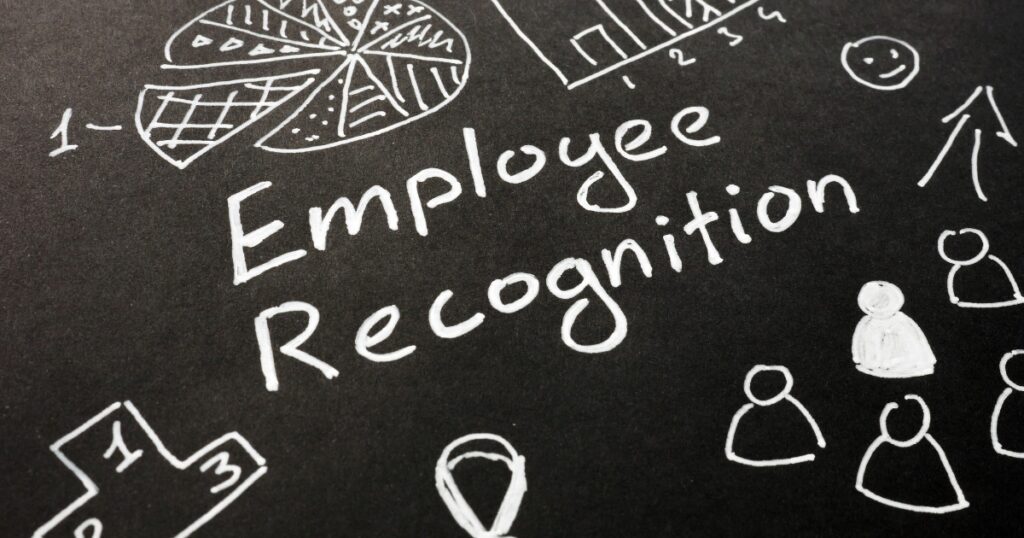In today’s competitive work environment, acknowledging and appreciating the hard work and dedication of employees is crucial for fostering a positive workplace culture.
Staff awards not only recognise individual achievements but also motivate others to excel. They can also be the source of good-humoured ribbing, depending on how seriously your company wishes to take the annual end-of-year employee awards.
Different types of awards can be presented to workers as a means of recognising not just their hard work and achievements, but what they bring to the table in other areas. So yes, recognising the office clown can be just as important as recognising the top-performing salesperson.
What are Recognition Awards?
Recognition awards are presented to members of staff to recognise an achievement, a significant landmark (such as 10 years of service), or a contribution. Many businesses choose to present engraved glass plaques at their annual office parties/awards presentations to their employees.
Often, they are voted for by colleagues – especially more fun award categories – while some types of awards tend to be decided upon by management, such as an employee of the year award. Whatever office awards categories you may have for your presentation, they should feel important so that the worthy recipient feels the prestige of the awards they have been presented.
Creative Staff Award Names
From quirky titles to personalised gestures, here are some creative staff award ideas that can be engraved on a recognition glass award to elevate morale and create a more engaged workforce.
- The Innovator’s Trophy: Recognise the employee who consistently generates groundbreaking ideas and implements innovative solutions within the company.
- Customer Champion Award: Acknowledge the team member who goes above and beyond to ensure exceptional customer satisfaction and loyalty.
- Team Player Plaque: Highlight the employee who is always willing to collaborate, support colleagues, and foster a sense of unity within the team.
- The Mentorship Medal: Honour an individual who excels in guiding and mentoring others, aiding in their professional growth.
- Positive Vibes Award: An award for the person who radiates positivity, uplifts spirits, and contributes to a harmonious work environment.
- Deadline Dynamo Trophy: Celebrate the team member who consistently meets or exceeds project deadlines, ensuring a smooth workflow.
- Inclusive Initiatives Award: Recognise efforts towards promoting diversity, equity, and inclusion within the workplace.
- Adaptability Ace Plaque: Highlight someone who adeptly navigates through changes, demonstrating resilience and flexibility.
- Inspirational Leadership Award: Acknowledge a leader who motivates, empowers, and leads by example, inspiring their team to excel.
- Problem-Solving Prodigy Trophy: Celebrate the individual with exceptional problem-solving skills, who consistently finds innovative solutions to challenges.
- Innovative Thinker’s Certificate: Honour someone who thinks outside the box and contributes original ideas that drive progress.
- Wellness Warrior Award: Recognise the employee dedicated to promoting health and wellness initiatives within the workplace.
- Rookie of the Year Trophy: Celebrate a newcomer who has made a significant impact or shown exceptional promise in a short period.
- Tech Trailblazer Award: Acknowledge someone who embraces and utilises technology to enhance productivity and efficiency.
- Environmental Sustainability Star: Recognise efforts towards promoting eco-friendly practices and sustainability within the organisation.
- Creative Collaborator Award: Highlight an individual who excels in cross-departmental collaboration, fostering creativity and synergy.
- Empathy Ambassador Plaque: Honour the person who demonstrates exceptional empathy, understanding, and support towards colleagues.
- Safety Superstar Trophy: Celebrate the team member committed to ensuring a safe working environment for everyone.
- Continuous Learner’s Certificate: Recognise someone dedicated to continuous learning and self-improvement, setting an example for others.
- Community Champion Award: Acknowledge contributions towards community outreach, volunteering, or philanthropic initiatives.
- Marketing Maestro Trophy: Celebrate outstanding achievements in marketing strategies, branding, or promotional campaigns.
- Financial Wizard Award: Highlight an individual who excels in financial management, budgeting, or cost-saving measures.
- Event Execution Excellence: Recognise exceptional planning and execution of events, showcasing organisational skills and creativity.
- Remote Work Rockstar Award: Acknowledge someone who thrives in remote work settings, maintaining high productivity and engagement.
- Storytelling Savant Trophy: Celebrate the individual who communicates effectively, crafting compelling narratives to convey messages.
- Lifetime Achievement Award: Honour a longstanding employee whose dedication, commitment, and contributions have significantly impacted the organisation over the years.
- Office DJ Award: Thank the resident office disc jockey for keeping the tunes, and productivity, flowing.
- Wooden Spoon: This is for that one person in the office who likes to play pranks and wind up their colleagues…all in good nature, of course!
- Chatter Box Award: Who is that one person who you can hear all day, every day? This is the award for them.
- Most Improved: This award is most commonly associated with sports teams, but there is no reason why the employee who has developed the most through the year cannot be recognised.
- Mr/Mrs Customer Service: Honour the member of staff who goes above and beyond for the customer, offering a level of service that others could only aspire to.
- Best Attendance Trophy: Recognise your most punctual member of staff, which is one of the most important qualities that any employee can possess.
- Best Dressed Award: Do you have a fashion-conscious employee in the office? Present this award to let them know their effort does not go unnoticed.
- Office Sage: This staff award can be presented to the one person in the office who can always be relied upon to give good advice.
- Fire Fighter Award: Who is the person most likely to put out fires in the office? Whether rectifying issues with clients or otherwise, this is a quality deserving of recognition.
- Office Meme Award: If your workplace uses digital communication channels, such as Microsoft Teams or Slack, it’s likely there is someone who seemingly has a meme for any occasion.

How to Present Office Awards
Presenting office awards is more than just a ceremony—it’s an opportunity to recognise and celebrate the hard work and dedication of employees. Whether it’s an annual event or a spontaneous recognition, the way awards are presented can significantly impact their value and the overall morale in the workplace. Here’s a guide on how to present office awards with flair and meaning.
Prepare a Thoughtful Ceremony
Begin by setting the stage for the award presentation. Consider hosting a dedicated ceremony, whether it’s a small team gathering or a larger company-wide event. The setting should reflect the significance of the occasion.
Craft Personalised Awards
Invest time in creating awards that resonate with the recipients. Personalisation could include the employee’s name, the specific achievement or trait being recognised, and even elements that reflect the company’s culture or inside jokes within the team.
Highlight Achievements
When presenting the awards, share anecdotes or specific examples of the recipient’s accomplishments. Highlight how their efforts have positively impacted the team or the organisation. This not only adds depth to the recognition but also makes it more meaningful and memorable.
Express Sincere Gratitude
Use the award presentation as an opportunity to express genuine appreciation for the recipient’s hard work. A heartfelt thank-you speech or message can amplify the impact of the award.
Involve the Team
In some cases, involving colleagues or team members in the presentation can make it even more special. Peer-to-peer recognition adds a layer of authenticity and demonstrates the collective appreciation for the recipient’s contributions.
Add a Touch of Surprise
Consider adding an element of surprise to the presentation. Whether it’s through unexpected timing, a unique venue, or a special guest presenter, surprises can make the moment even more memorable.
Capture the Moment
Document the award presentation through photographs or videos. This not only preserves the memory but also allows the recognition to be shared and celebrated beyond the event itself.
Follow Up with Appreciation
After the ceremony, follow up with a personalised note or message to the recipient, reiterating your appreciation and the significance of their contributions. This further reinforces the recognition and its value.
Encourage Applause and Celebration
Ensure that the recognition is met with applause and celebration. Creating a positive and enthusiastic atmosphere during the award presentation boosts morale not only for the recipient but for the entire team.
Seek Feedback and Adapt
After the presentation, seek feedback from both the recipients and the team. Understanding what resonated and what could be improved helps in refining future award ceremonies, making them even more impactful.
Remember, the goal of presenting office awards goes beyond the physical token—it’s about acknowledging and appreciating the hard work, dedication, and contributions of individuals within the organisation.
By infusing meaning, personalisation, and genuine appreciation into the presentation, these awards become powerful tools for boosting morale, fostering a positive work environment, and ultimately, driving overall success.
Recognition in the workplace isn’t merely a formality—it’s a powerful tool that nurtures a positive work environment, motivates employees, and drives success. Building a culture of recognition goes beyond occasional praise; it involves consistent, meaningful gestures that acknowledge and appreciate the efforts of individuals. Here’s a comprehensive guide on implementing a culture of recognition in the workplace and the transformative impact it can have.

Understanding the Essence of Recognition Awards
Recognition isn’t just about acknowledging exceptional performance or achievements; it’s about valuing the contributions, dedication, and hard work of employees at all levels. It encompasses verbal appreciation, tangible rewards, opportunities for growth, and fostering a supportive environment that celebrates both small victories and major milestones.
Lead by Example: Cultivating a culture of recognition starts at the top. Leaders and managers must set the tone by actively recognising and appreciating their team members’ contributions. When leadership demonstrates the value of recognition, it cascades throughout the organisation.
Make it Timely and Specific: Recognise achievements promptly and be specific about what is being appreciated. This could range from acknowledging a successful project completion to praising an individual’s dedication to teamwork or innovative thinking.
Create a Variety of Recognition Channels: Implement diverse ways of recognition, including verbal praise during team meetings, written notes or emails, shout-outs on internal communication platforms, and formal award ceremonies. Variety ensures inclusivity and caters to different preferences.
Foster Peer-to-Peer Recognition: Encourage a culture where employees appreciate each other’s efforts. Peer recognition is often as impactful as formal recognition from management, fostering a sense of camaraderie and mutual respect.
Align Recognition with Core Values: Ensure that recognition efforts align with the company’s core values. This helps in reinforcing the desired behaviours and work ethics, making recognition more meaningful and tied to the company’s vision.
Offer Personalised Recognition: Tailor recognition efforts to suit individual preferences. Some employees may appreciate public acknowledgement, while others might prefer private praise or tangible rewards. Personalisation adds depth and sincerity to the recognition.
Link Recognition to Career Growth: Connect recognition with career development opportunities. Providing advancement prospects, skill-building workshops, or mentorship opportunities can motivate employees and give recognition a more lasting impact.
Celebrate Milestones and Achievements: Acknowledge significant milestones, both personal and professional. Whether it’s work anniversaries, project successes, or personal achievements, celebrating these moments fosters a culture of appreciation and camaraderie.
Solicit Employee Feedback: Regularly seek feedback from employees about recognition practices. Understanding what resonates with them helps tailor recognition efforts to be more effective and meaningful.
Measure and Celebrate Progress: Establish metrics to gauge the effectiveness of recognition efforts. Celebrate milestones in building a culture of recognition, reinforcing its importance and impact.
The Transformative Power of Recognition
Implementing a culture of recognition brings forth numerous benefits that positively influence workplace dynamics and employee engagement:
Boosted Morale and Motivation: Employees feel valued and appreciated, leading to increased job satisfaction and motivation to perform better.
Improved Retention and Loyalty: Recognition fosters a sense of belonging and loyalty, reducing turnover rates and retaining top talent within the organisation.
Enhanced Productivity: Appreciated employees are more engaged, leading to higher productivity levels and a positive impact on overall business performance.
Stronger Team Dynamics: Recognition encourages teamwork and collaboration, fostering a cohesive work environment where employees support each other.
Greater Innovation and Creativity: Employees feel empowered to contribute ideas and innovations when their efforts are acknowledged, leading to a culture of continuous improvement.
Implementing staff awards encourages a culture of appreciation and recognition within the workplace. These unique and diverse award ideas not only celebrate individual achievements but also reinforce the values and goals of the organisation.
The Year-Round Significance of Acknowledging Staff Achievements
In a workplace, recognition shouldn’t be confined to sporadic events or annual awards ceremonies. Acknowledging staff achievements all year round is a fundamental aspect of nurturing a positive work culture and fostering continuous growth.
When managers fail to recognise their staff, it affects employee morale detrimentally. Here’s why consistent recognition throughout the year is crucial for employee morale, motivation, and overall organisational success.
Sustained Motivation: Recognising staff achievements regularly keeps motivation levels high. It serves as a continual reminder that their efforts are valued, encouraging employees to maintain their performance standards consistently.
Reinforcement of Desired Behaviours: Continuous recognition reinforces positive behaviours and work habits. When achievements are acknowledged promptly, it reinforces the idea that these behaviours are essential and align with the company’s goals and values.
Encourages Consistency in Performance: Year-round recognition prompts employees to strive for consistency in their performance. It encourages them to deliver their best consistently rather than sporadically.
Builds a Culture of Appreciation: A culture of recognition promotes an environment where appreciation is a norm. When recognising staff achievements becomes a regular practice, it ingrains a sense of appreciation and gratitude within the workplace.
Boosts Employee Engagement: Engaged employees are more committed to their work. Regular recognition fosters a sense of belonging and commitment, leading to increased engagement levels among staff members.
Supports Continuous Improvement: Acknowledging achievements consistently encourages employees to seek continual improvement. It motivates them to innovate, learn, and grow professionally, contributing to the organisation’s overall progress.
Increases Retention and Loyalty: Employees who feel valued and appreciated are more likely to stay loyal to the organisation. Recognising their efforts throughout the year creates a sense of loyalty and reduces turnover rates.
Fosters a Positive Work Environment: A workplace where achievements are consistently recognised tends to have a positive and uplifting atmosphere. This positivity influences collaboration, communication, and overall employee satisfaction.
Recognises Efforts Beyond Big Wins: Year-round recognition isn’t just about celebrating significant achievements; it acknowledges small victories, milestones, and efforts that might otherwise go unnoticed. It appreciates the journey as much as the destination.
Personalised and Timely Feedback: Regular recognition allows for more personalised and timely feedback. This feedback can be used to guide employees, helping them understand their strengths and areas for improvement.
Implementing Year-Round Recognition Strategies
To effectively acknowledge staff achievements throughout the year, organisations can adopt various strategies:
- Regular Feedback Sessions: Schedule frequent feedback sessions to acknowledge achievements, discuss progress, and offer guidance.
- Peer Recognition Programs: Encourage employees to appreciate and recognise each other’s efforts through peer-to-peer recognition programs.
- Spotlight Moments: Use internal communication channels to highlight individual achievements, projects, or milestones regularly.
- Personalised Thank-You Notes: Send personalised thank-you notes or emails to acknowledge specific achievements promptly.
- Continuous Learning Opportunities: Recognise and reward employees actively seeking learning and development opportunities.
- Managerial Support and Recognition: Encourage managers to recognise achievements promptly during day-to-day interactions with their teams.
Recognising staff achievements consistently throughout the year goes beyond occasional gestures; it’s about embedding a culture of appreciation and support within the fabric of the organisation. By acknowledging efforts consistently, organisations not only motivate employees but also create an environment where individuals feel valued, engaged, and committed to contributing their best continuously.
Year-round recognition isn’t just a nice-to-have; it’s a vital component for sustaining a thriving workplace culture. Remember, the key to successful staff awards lies not just in the recognition but also in the sincerity and authenticity behind the appreciation, fostering a more motivated and engaged workforce.

Benefits of Employee Awards in the Workplace
In today’s competitive business landscape, fostering a positive and motivating work environment is crucial for both employee satisfaction and organisational success. One highly effective way to cultivate such an environment is through the implementation of employee awards and recognition programs.
These programs acknowledge the exceptional contributions of individuals within an organisation, fostering a culture of appreciation and driving numerous benefits for both employees and the company.
Firstly, employee awards serve as powerful tools for motivation and morale enhancement. When employees receive recognition for their hard work, dedication, and achievements, it validates their efforts and boosts their morale. This validation fosters a sense of pride in their work and encourages them to continue delivering high-quality performance. Furthermore, recognition helps in enhancing job satisfaction, leading to increased engagement and a more positive work atmosphere.
Employee awards also play a pivotal role in promoting a culture of appreciation and gratitude within the workplace. When employees see their colleagues being recognised for their accomplishments, it sets a positive example and encourages others to strive for excellence. This, in turn, cultivates a supportive and collaborative work environment where individuals celebrate each other’s successes, fostering a sense of camaraderie and teamwork.
Moreover, such recognition programs can significantly impact employee retention and loyalty. Employees who feel appreciated and valued by their organisation are more likely to remain committed to their roles. This reduces turnover rates and the associated costs of hiring and training new employees. Recognised employees are also more inclined to become brand advocates, positively impacting the company’s reputation and attracting top talent.
Employee awards serve as a platform to showcase and reinforce the company’s values and goals. By aligning awards with these values, organisations reinforce the behaviours and achievements that contribute to their success. For instance, recognising innovation, teamwork, or exceptional customer service reinforces the importance of these qualities within the organisational culture, guiding employees towards embodying these values in their everyday work.

Furthermore, employee awards can act as powerful motivators for continuous improvement. When employees strive for recognition, they often go above and beyond their regular duties, seeking opportunities for professional development and growth. This drive for improvement not only benefits the individual but also contributes to the company’s overall progress and innovation.
Implementing an effective employee awards programme doesn’t solely benefit the employees; it also yields positive outcomes for the organisation. Improved employee morale and engagement lead to increased productivity and performance levels, positively impacting the company’s bottom line. Additionally, a culture of recognition can enhance the employer’s brand, making it an attractive workplace for prospective employees.
However, to maximise the impact of employee awards, it’s essential to ensure fairness, transparency, and inclusivity in the recognition process. Clear criteria for eligibility, impartial judging panels, and opportunities for all employees to be considered for awards are critical elements to maintain the integrity of such programs.
Incorporating staff award ideas can play a pivotal role in boosting morale, fostering a positive work environment, and ultimately contributing to the overall success of the organisation.
